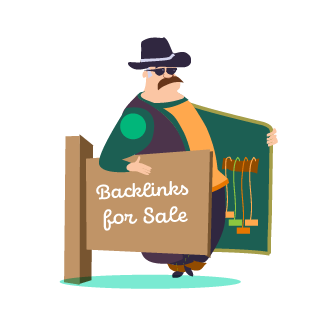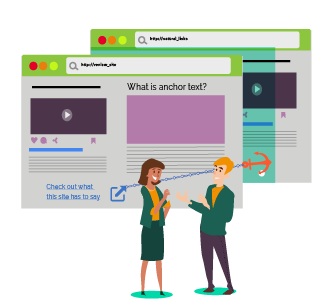Link buying has been around since the earliest days of Google.
Once marketers and website owners discovered that you could manipulate rankings by increasing the number of links to your site, backlinks became a commodity.
As a new entrant in the digital sphere, you’ll soon discover that it takes a lot of effort to build a strong link profile, and you may be tempted to take the easier route and buy backlinks.
But the truth is, buying backlinks can actually be dangerous for your website.
Not only does cheating the SEO system come with huge penalties from search engines like Google, but the backlinks most people purchase tend to have little to no domain authority, meaning they can actually damage your website’s rankings.
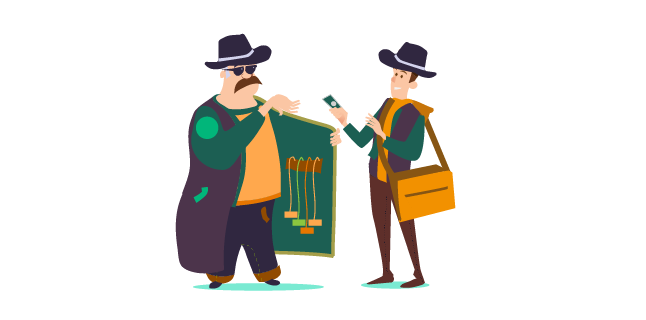
Buying backlinks is definitely a black-hat practice. It’s seen as a way to artificially get yourself to the top. And yet, still so many businesses fall into the trap. Why? Because it appears like an easy way to climb their way up Google’s rankings.
Below, you’ll find out more about backlinks and their influence on your SEO. As well as the impact that buying backlinks can have on your website.
What are Backlinks?
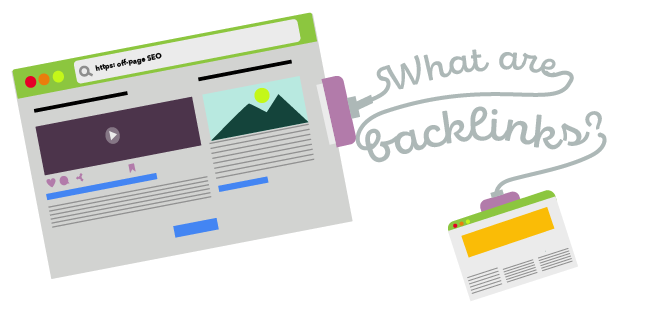
Backlinks – or ‘inbound’ links as they are commonly referred to – are hyperlinks from external web pages which connect to one of your webpages.
These links tend to come from websites who share a relevant interest with you. Or who are in the same industry or niche as you. As such, when they link back to your website, it’s usually because they’re referring their target audience to your content. This is because they feel it is relevant and interesting for their audience.
When it comes to improving your website’s off-page SEO and page rankings, backlinks are very important.
Whenever you collect backlinks from high-quality websites, search engines like Google see these links as signals. Naturally these signals tell Google that your content is relevant and worth being seen.
In a nutshell, backlinks tell search engines: “people should see what this website is saying. They have some helpful information on the topic we’re interested in”.
Therefore, the more quality inbound links your website can collect, the better. Because the more compelled search engines will feel to rank your content higher. As a result, you will start to appear higher in search engine results pages (SERPs) for your targeted keywords. And, you will start to drive more traffic to your website.
Why Do People Buy Backlinks?
The process of acquiring a collection of quality backlinks is quite time-consuming, involving a lot of research and outreach.
As a new website, it’s highly unlikely that your content is going to be ranking highly within search engines. Therefore, when you are looking to launch your backlink campaign, you’ll need to do lots of work in promoting your content.
Typically, this involves researching websites that are relevant to your niche, contacting them, and then finding a way for them to offer a backlink to your website.
Most commonly, those looking to gain backlinks will offer to guest blog on another website, take part in a paid sponsorship or advertising. Or link their relevant content to help answer questions on forums like Quora or Reddit.
On top of having to actually produce the original content on your website, this additional layer of promoting your content ends up requiring a lot of extra time. Time which many small or new businesses don’t often have.
Therefore, when they see the opportunity to purchase backlinks, they are enticed. The opportunity to spend a small fee to get the same result as if they were to work away a chunk of time. Are you telling me you wouldn’t be intrigued?
But the truth is, if something seems too good to be true, then it probably is. And, as tempting as it may be to purchase backlinks, you should never do it.
Reasons Why You Should Never Buy Backlinks
Purchasing backlinks is a practice seen less and less on the internet. Yet, in the dark corners of the internet it still happens. With vulnerable website owners finding themselves being taken advantage of in the hope for better page rankings.
Adverts that guarantee a certain domain authority or ranking for a set price should never be considered. As they can certainly cause more harm than good for your website.
Let’s take a look in more detail as to why you should avoid buying backlinks.
1. Purchased Links Usually Come From Link Farms

Services that sell links to websites are usually part of a link farm or other low-quality ‘news’ websites which exist purely to link to as many different websites as possible.
Typically, the content on these websites are often gibberish and have no benefit for any searcher that ends up landing on them.
Because of their low quality, these link farms typically have low domain authorities. Meaning that if they were to link to your website, they could end up pulling your overall domain strength down. This would impact your page rankings on Google. And it could even have you penalised by the search engine itself. Especially if Google suspects you’re trying to cheat the system (more on that later).
2. Buying Backlinks Is Costly, Without A Guaranteed Return On Investment
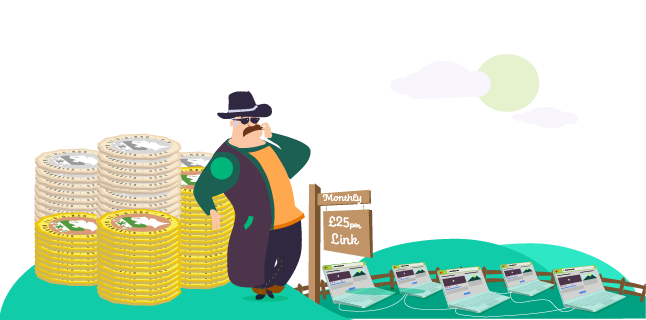
As compelling as a flashing ad or well-written email may be, there is actually no guaranteed return on investment when purchasing backlinks.
In fact, for search engines to avoid catching link farms, those sites can only sell a small number of links to relevant sites. These links have been embedded within text copy that seems natural.
As you can imagine, these links tend to be pretty expensive. As a result, you can expect to pay at least £25 a month for each one. And, for these links to have any impact, you’re probably going to need a pretty sizable amount of them. Probably around ten (at least) to see something minimal happen to your rankings.
When you tot the numbers up, it seems like a much more worthwhile investment to spend that money on outreach. In fact, effective outreach strategies, such as digital PR are more valuable and can help build a natural link profile.
Even though there is also no guaranteed return with digital PR agencies, you can rest assured knowing that you’re doing everything by the book in trying to gain backlinks, as well as putting your brand name in front of some relevant news sites, bloggers and influencers.
3. Growing Your Backlinks Is An Ongoing Effort
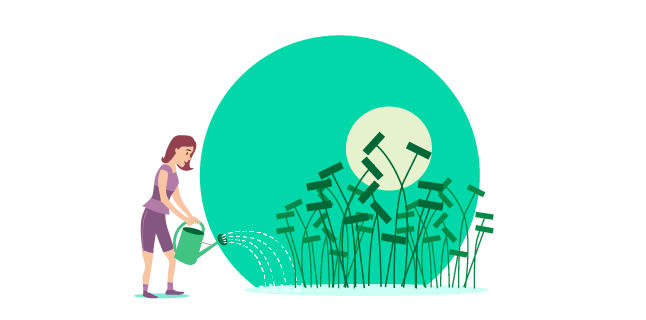
The number of backlinks you need should never be a set target. Instead, it should be considered an ongoing process to collect as many as possible.
Even if you find yourself ranking in position one for a specific search term, you still need to continue collecting quality backlinks. The moment you take your foot off the pedal, the easier it will be for your competitors to outrank you.
Therefore, in order for buying backlinks to be a viable option, it’s going to cost you. You’re going to end up spending a lot of money to keep growing your link profile.
Again, in this scenario, it seems to make much more sense to spend your money on actually increasing your resources. Plus by doing backlinking properly, there’s no risk of penalisation.
4. Link Farms Get Shut Down Easily
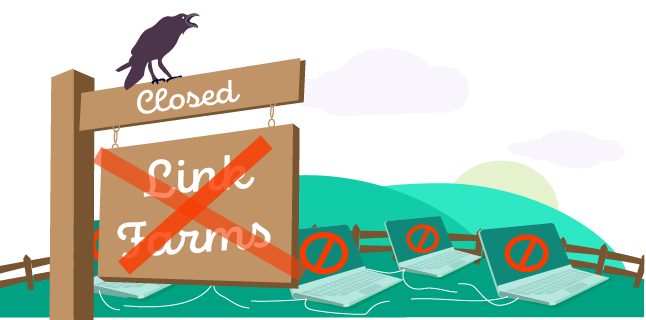
As soon as search engines like Google discover link farm sites, they shut them down.
Usually, this doesn’t take too long either. In fact, for Google’s bots, it only takes one traceable backlink for them to discover these low-quality, spam sites.
So, if you choose to spend your available budget on buying links. But then those sites are shut down suddenly, you’ll be receiving absolutely no return on investment. Your backlink will exist no more. As a result, you may as well have poured your money quite literally, down the drain.
5. Buying Links Breaches Google’s Guidelines
If you need any better reason as to why you shouldn’t be buying backlinks, then this is probably the one.
When it comes to buying links, it’s a definite ‘no’ from Google.
Over the years, Google have clearly stated that exchanging money in return for backlinks is a clear breach of their guidelines. As such, anyone caught doing it “can negatively impact [their] site’s ranking in search results”.
Google is a very complex machine. Their clever ‘bots’ can easily follow your website’s backlinks and trace them back to low-quality link farm sites.
If they detect that you’ve purchased your backlinks, you will face a penalty from Google. Though, even worse, your website could be removed entirely from the search engine! 
But what happens if a low-quality website that I haven’t bought links from is linking to my content?
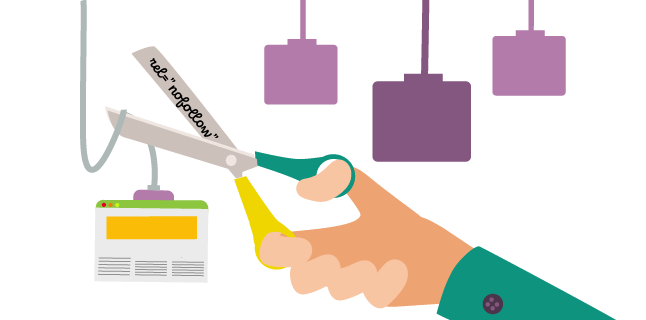
You find yourself in a position where a low-quality website decides to link to your content. What do you do? Well, there is a trick you can use to stop Google’s bots from following those links.
This trick involves attributing a small piece of code to a backlink: rel=”nofollow”
The code then tells search engines not to follow that specific link. As such Google will not include that link when determining your page rank value.
Are there any other instances when I should use nofollow links?
There are three main reasons why you may want to attribute nofollow code to your links. These are:
1. Unrelated content from unknown sites
All links from sites that you don’t know and don’t trust should have the nofollow code attributed to them.
I would always recommend checking an unknown website out first. This is to see if their content is relevant to what’s showing on your site. However, if you take a look at the site and determine that it’s spam or low quality, use the code to stop Google’s bots from relating that site to yours.
2. Paid links
Google has openly stated that you should never exchange money for links. This means buying backlinks is explicitly frowned upon by Google. Putting backlink purchases for the purpose of SEO rankings aside for one moment, this statement also refers to paying for sponsorships or advertisements.
This doesn’t mean that you shouldn’t engage in paid sponsorships or collaborations. In fact, these types of partnerships can be very valuable in getting increased brand visibility amongst your target audience if you can work with bloggers and influencers to promote your products or service.
But should you choose to market yourself in this way, you need to code it appropriately.
Over the past few years, Google has evolved their ‘nofollow’ code and created different variations, depending on the type of backlink you have.
So, if you have taken part in a paid advertisement or sponsorship, you can now attribute it with the following code: “rel=sponsored”
As a result of using this type of code, Google will not penalise you for your sponsorship. But will instead be able to better understand the relationship between your website and the external site.
The sponsorship won’t be used to determine your page rankings. However, it will prevent you from any possible link scheming penalties.
3. User generated content (UGC)
Sometimes, when you allow users to comment on your blog or forum, you may find that you have spam accounts sharing links back to their own websites, or, your own audience members including backlinks to other related content or their own blogs.
As great as it is to see user generated content on your site, more often than not, the sites that they share tend to have low domain authority scores. Consequently, if Google and other search engines were to consider these links when ranking your content, they would negatively impact your own rankings, making you less visible to searchers.
Therefore, you should use a specific UGC no follow code – rel=”ugc” – and attribute it to any links which come from your audience. Google’s bots will then understand that this content is not your own and won’t include it in their decision of where to rank your pages.
This way, you can keep your users happy by keeping their content on your site, without damaging your rankings on Google.
Summary
Wondering if you should purchase backlinks to improve your website’s SEO? The answer is a straight up no.
As appealing as it may be to buy links that can allegedly deliver the same results as if you were to put in the hard work yourself…don’t. The saying goes that ‘if it seems too good to be true, it probably is.’ And that certainly rings true when it comes to purchasing backlinks.
Buying backlinks is considered a black-hat method of marketing. Not only is it cheating the system, but it actually breaches Google’s own guidelines. If you’re caught to be doing so, you can face serious penalties.
Penalties aside, buying backlinks doesn’t always guarantee great rankings either. As confident as you may feel that these sites are going to help improve your SEO, they often have low domain authorities themselves (because they tend to be full of gibberish) and therefore, can actually have a negative impact on your website’s SEO.
Gaining backlinks isn’t a right. It’s a reward for creating and promoting great content. If you want to improve your SEO rankings, you need to put in the hard work now. By creating a great content marketing strategy, and then taking the time to outreach and network with other website owners.
It may take a lot of time and effort. But once your content starts to be recognised as the best in the business, you’ll have a well-oiled content machine. One that’s gaining backlinks and driving traffic off its own accord.
Outsourcing Your SEO
Building a quality and diverse backlink profile is just one component of SEO. In fact, there are many other ranking factors to be considered when planning your overall marketing strategy.
Creating and delivering a strategy that helps you to achieve your goals takes a huge amount of time and effort. Not to mention it requires daily work to make it a success.
For many new or small businesses, they usually don’t have the capacity needed to dedicate to such projects. As a result, often outsource their SEO to a marketing consultant, such as myself. Someone who has the experience to deliver a winning strategy.
How a marketing consultant can help
My team and I have worked with a whole range of businesses. Helping them to improve their rankings, and – as a result – increase their conversions and sales. And we’d be more than happy to help you achieve your goals too.
If you are looking for a marketing consultancy that can create and implement an SEO strategy. One that’s uniquely tailored to your business goals, then get in contact today for an obligation-free chat.
I’d be more than happy to talk you through our processes. And I can provide you with some examples of our previous work and successes.
